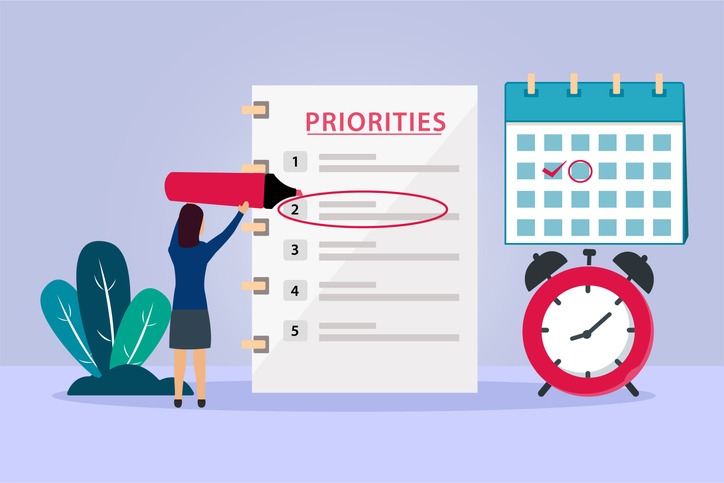
Prioritisation for primary care professionals is one of the most important skills to have in your practice manager armoury – Daniel Vincent discusses the best ways to direct your efforts towards the right priorities.
CREDIT: This is an edited version of an article that originally appeared on Enhanced Primary Care
As a primary care professional, your days are often filled with competing demands, making it challenging to distinguish between what is truly important and what is merely urgent.
The Eisenhower Matrix helps you effectively categorise your tasks and ensure that your efforts are directed towards the right priorities.
Let’s explore the world of prioritisation to help you overcome the constant firefighting and pave the way for a more productive and satisfying work life in primary care.
The importance of prioritisation in primary care
As practice managers and GP partners, you’re no stranger to the relentless demands and responsibilities that come with your role. Juggling countless tasks while still delivering high-quality patient care can be overwhelming. This is where prioritisation plays a crucial role.
Prioritising your tasks helps you:
- Allocate time and energy to high-impact tasks
- Reduce stress levels by tackling tasks systematically
- Improve overall productivity and efficiency
- Enhance decision-making and problem-solving skills
By understanding the importance of prioritisation and implementing a structured approach, you can take control of your workload and deliver better results for your patients and practice.
Deciding if a task is ‘urgent’
Determining the urgency of a task is crucial for prioritising your workload effectively. It’s important to differentiate between tasks that are genuinely urgent and those that only appear urgent due to external pressures.
Here are some factors to consider when deciding if a task is urgent:
- Deadlines: Tasks with approaching deadlines should be considered urgent. Keep track of deadlines and allocate time accordingly to avoid last-minute rushes.
- Dependencies: Some tasks need to be completed before others can begin. Identify tasks with dependencies and prioritise them to prevent bottlenecks in your workflow.
- Consequences: Evaluate the potential consequences of not completing a task on time. If delaying a task could have severe repercussions for your patients, team, or practice, it’s likely urgent.
- External pressures: Be mindful of external pressures that may create a false sense of urgency. Assess whether these tasks are truly urgent or if they can be managed later without significant consequences.
Identifying ‘important’ tasks
Understanding the importance of a task is crucial for effective prioritisation. Important tasks are those that have a significant impact on your practice’s goals, long-term success, and patient care. Here’s how to decide if a task is important:
- Alignment with goals: Evaluate how a task aligns with your practice’s objectives and mission. Tasks that contribute directly to achieving these goals are typically important.
- Value to patients: Prioritise tasks that positively impact patient care, satisfaction, and health outcomes. These tasks are essential for maintaining a high-quality practice.
- Long-term impact: Consider the long-term consequences of a task. Tasks that may not appear immediately important but contribute to the overall growth and development of your practice should be considered important.
- Efficiency: Tasks that improve your practice’s processes and workflow, increasing efficiency and productivity, are important. Streamlining your operations can lead to better patient care and more effective use of resources.
The significance of ‘important but not urgent’ tasks
Tasks that are important but not urgent (NUI) tend to be overlooked in the daily hustle and bustle of primary care. However, these tasks are crucial for the long-term success of your practice. Here’s why NUI tasks matter:
- Strategic planning: NUI tasks often involve strategic thinking and planning, which help set the direction for your practice’s future growth and development. By focusing on these tasks, you can proactively address potential challenges and seize opportunities for improvement.
- Preventing future crises: Addressing NUI tasks can help you prevent future problems from arising, reducing the need for firefighting. For example, implementing a robust patient appointment system can help prevent overbooking and reduce wait times, improving patient satisfaction in the long run.
- Professional development: NUI tasks often involve opportunities for learning and professional growth, such as attending training sessions or updating your skills. Investing time in these activities can lead to better patient care and a more skilled workforce.
- Work-life balance: Focusing solely on urgent tasks can lead to burnout and negatively impact your work-life balance. By allocating time for NUI tasks, you can reduce stress and maintain a healthier, more sustainable work environment.
Navigating non-urgent, non-important tasks: finding the right balance
While it’s essential to focus on urgent and important tasks, it’s also worth taking a moment to consider non-urgent, non-important (NUNI) tasks. These tasks may not directly impact your practice’s performance, but they can still play a role in your overall workload management. Here’s how to navigate NUNI tasks effectively:
- Identify and evaluate NUNI tasks: Take the time to review your task list and identify NUNI tasks. Evaluate their relevance and potential impact on your practice or personal development. Are they truly non-urgent and non-important, or do they hold hidden value?
- Consider personal growth and team building: Some NUNI tasks may contribute to personal growth or team-building activities, like attending optional training sessions, reading industry news, or participating in social events. While these tasks may not be directly related to your primary responsibilities, they can still have a positive impact on your practice and team dynamics.
- Allocate time for NUNI tasks: While it’s important not to prioritise NUNI tasks over urgent or important tasks, you can still allocate time for them in your schedule. Consider setting aside a small amount of time each week to address NUNI tasks, ensuring they don’t interfere with higher priority items.
- Delegate or eliminate: If a NUNI task is truly non-essential and doesn’t contribute to personal or professional growth, consider delegating it to a team member with available bandwidth or eliminating it altogether. This will help you focus your time and energy on tasks that have a more significant impact on your practice.
Bringing it all together: Mastering prioritisation for primary care professionals
Now that you understand the importance of prioritisation, the urgency and importance matrix, and the significance of important but not urgent tasks, it’s time to bring everything together and apply these principles in your daily routine. Here are some tips for mastering prioritisation in primary care:
- Consistently evaluate your tasks: Make it a habit to regularly assess your tasks and categorise them according to urgency and importance. This will help you maintain a clear overview of your workload and ensure you’re focusing on the right tasks.
- Schedule time for NUI tasks: Allocate dedicated time in your calendar for NUI tasks, ensuring they don’t get neglected. By proactively planning for these tasks, you can avoid last-minute scrambles and keep your practice running smoothly.
- Delegate effectively: Recognise that you can’t do everything yourself. Learn to delegate tasks to your team members based on their skills and expertise. This will not only help you focus on your core responsibilities but also empower your team and foster a collaborative work environment.
- Review and adjust: Periodically review your priorities and task categorisation, making adjustments as needed. Stay flexible and be willing to adapt to changing circumstances or new information that may impact your priorities.
- Track progress and celebrate successes: Keep track of your progress and celebrate the completion of important tasks, both urgent and non-urgent. Recognising your achievements can help maintain motivation and drive continuous improvement.
By mastering prioritisation in primary care, you can significantly improve your workload management, enhance your practice’s performance, and create a more sustainable work-life balance for yourself and your team. Remember, effective prioritisation is the key to long-term success and growth in primary care.



Be the first to comment